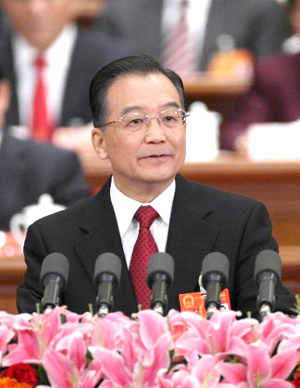|

Premier Wen Jiabao delivers a report on the work of the government at the opening meeting, which was presided over by NPC Standing Committee Chairman Wu Bangguo.
|
"We vigorously responded to the complex and volatile international environment, strove to overcome various difficulties hindering economic and social development, and prevailed over the sudden and severe outbreak of SARS and catastrophic natural disasters such as the recent snow and ice storms," Wen said in his government work report.
China's GDP in 2007 reached 24.66 trillion yuan, an increase of 65.5 percent over 2002 and an average annual increase of 10.6 percent, rising from the sixth highest one in the world to the fourth. Total government revenue reached 5.13 trillion yuan, a 171 percent increase over 2002. Foreign exchange reserves exceeded 1.52 trillion U.S. dollars.
The agricultural tax was rescinded, ending the centuries-old practice of farmers paying taxes. China's grain output rose four consecutive years to top 500 billion kilograms in 2007, he said.
Free compulsory education was made available to all rural students, marking an important milestone in the history of the development of education in China. The basic frameworks for a public health system and a system of basic medical services covering both urban and rural areas have been put in place, he added.
But he also admitted that China has experienced overheated growth in fixed asset investment, excessive supplies of money and credit, and imbalance in its international payments in recent years. The current price hikes and increasing inflationary pressures are the biggest concern of the people.
"Both uncertainties in the international economic environment and potential risks have increased," he added.
Under such background, he set the following targets for economic and social development in 2008: on the basis of improving the economic structure, productivity, energy efficiency and environmental protection, the GDP should grow by about 8 percent, and the rise in the CPI should be held at around 4.8 percent.
Ten million jobs should be created in urban areas, and the rate of registered urban unemployment should be kept at around 4.5 percent. Some improvement should be made in the balance of payments.
After the central economic work meeting, which was held late last year, for the first time proposed the "two prevents", Wen reiterated in the report that the primary task for macroeconomic regulation this year is to prevent fast economic growth from becoming overheated growth and keep structural price increases from turning into significant inflation.